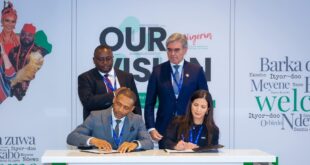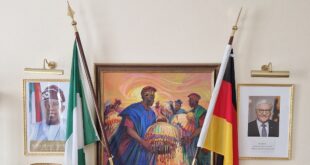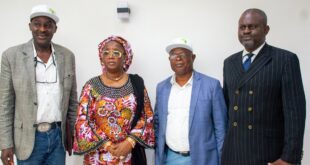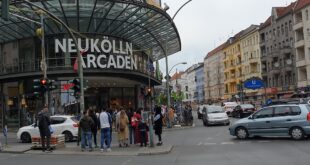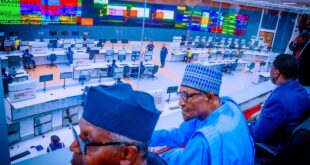The controversy surrounding accusations of malpractices against the President of the African Development Bank (AfDB), Dr Akinwumi Adesina, seems to have been resolved for now on Thursday.
Some officials of the Abidjan, Cote d’Ivoire-based Bank had accused Dr Adesina of lack of respect of internal rules and regulations in recruitment, citing numerous cases of nepotism and favouritism.
The AfDB’s Ethics Committee, made up of executive directors representing shareholder nations, deliberated over every single one of the allegations over a three-month span and cleared Adesina on all the charges.
However, the US, a major shareholder in the Bank, wants an external body to probe the allegations anew against the internal rules of the bank. Observers believe that the American position is a ploy to scuttle the reelection of Adesina for a second 5-year term as president of the AfDB.
The Board of Governors of the Bank after lengthy deliberations on Thursday though rejected the US demand that an independent investigation of the accusations be carried out anew but agreed that the findings of the Bank’s Ethics Committee be reviewed by an independent investigator.
It was a compromise that the Board considers necessary to carry all its shareholders along.
Below is the Communique of the Bureau of Boards of Governors of the Bank following its Meeting of 4 June 2020 in Abidjan regarding the complaints against the President of the Bank
• a) The Bureau reiterates that it agrees that the Ethics Committee of the Boards of Directors performed its role on this matter in accordance with the applicable rule under Resolution B/BG/2008/11 of the Board of Governors.
• b)The Bureau also reiterates that the Chairperson of the Bureau of the Board of Governors performed her role in accepting the findings of the Ethics Committee in accordance with the said Resolution.
• c) However, based on the views of some Governors on the matter and the need to carry every Governor along in resolving it, the Bureau agrees to authorize an Independent Review of the Report of the Ethics Committee of the Boards of Directors relative to the allegations considered by the Ethics Committee and the submissions made by the President of the Bank Group thereto in the interest of due process.
• d) The Independent Review shall be conducted by a neutral high calibre individual with unquestionable experience, high international reputation and integrity within a short time period of not more than two to four weeks maximum, taking the Bank Group’s electoral calendar into account.
• e) The Bureau agrees that, within a three to six month period and following the independent review of the Ethics Committee Report, an independent comprehensive review of the implementation of the Bank Group’s Whistle-Blowing and Complaints Handling Policy should be conducted with a view to ensuring that the Policy is properly implemented, and revising it where necessary, to avoid situations of this nature in the future.
Analysts hope that the conclusion of the independent investigator’s work will enable the AfDB carry out the election of its President as scheduled in August. Dr Adesina has been endorsed by all the 54 African member countries of the bank. However, the US, supported by some other non-African shareholders, opposes the reelection of Adesina despite his generally-agreed good performance at the AfDB’s helm.
The US is a non-African member of the bank and a major shareholder at that. The top 10 shareholders of the AfDB are Nigeria (8.20%), USA (6.60%), Egypt (5.60%), Japan (5.50%), South Africa (5.10%), Algeria (4.20%), Germany (4.20%), Canada (3.90%), France (3.80%) and Côte d’Ivoire (3.80%). The voting power on the bank’s Board is split according to the size of each member’s share, currently 60%-40% between African and non-African member countries.
The AfDB’s mission is to fight poverty and improve living conditions on the continent through promoting the investment of public and private capital in projects and programs that are likely to contribute to the economic and social development of the region.
Kola Tella
READ ALSO Why the US opposes Akinwumi Adesina’s re-election as African Development Bank’s president
 THE AFRICAN COURIER. Reporting Africa and its Diaspora! The African Courier is an international magazine published in Germany to report on Africa and the Diaspora African experience. The first issue of the bimonthly magazine appeared on the newsstands on 15 February 1998. The African Courier is a communication forum for European-African political, economic and cultural exchanges, and a voice for Africa in Europe.
THE AFRICAN COURIER. Reporting Africa and its Diaspora! The African Courier is an international magazine published in Germany to report on Africa and the Diaspora African experience. The first issue of the bimonthly magazine appeared on the newsstands on 15 February 1998. The African Courier is a communication forum for European-African political, economic and cultural exchanges, and a voice for Africa in Europe.









